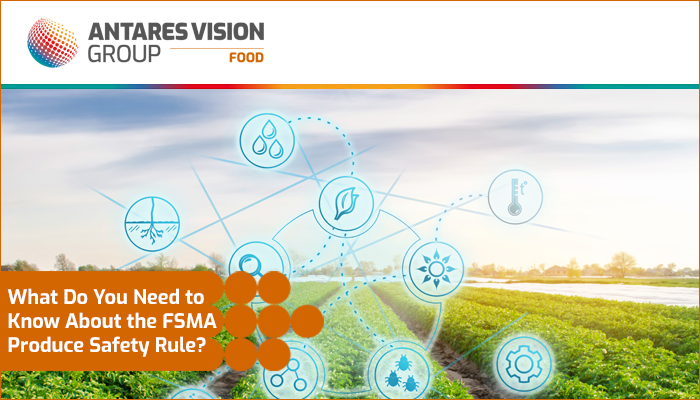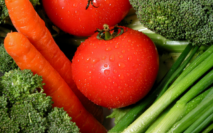The Food Safety and Modernization Act (FSMA) is going to have a major impact on the food industry. FSMA gives the Food and Drug Administration (FDA) enforcement capabilities to promote food safety, transparency, and quality, and the FSMA Produce Safety Rule is particularly important to the changes.
The FSMA Produce Safety Rule applies to commercial growers, harvesters, and packers of produce. The rule includes preventive controls designed to mitigate the spread of pathogens and foodborne illness through agricultural water, wild animals, and any raw agricultural commodity designed for human consumption. Here’s what you need to know.
Importance and Business Value of the FSMA Produce Safety Rule
In effect since January 26, 2016, the FSMA Produce Safety Rule (“Standards for the Growing, Harvesting, Packing, and Holding of Produce for Human Consumption”) is a major step forward for agricultural traceability, food safety, and public health. As the FDA explains, it “establishes, for the first time, science-based minimum standards for the safe growing, harvesting, packing, and holding of fruits and vegetables grown for human consumption. The rule is part of the Agency’s ongoing efforts to implement the FDA Food Safety Modernization Act.”
Familiarizing yourself with the FSMA Produce Safety Rule will help comply USDA and FDA regulations, avoid fines or other regulatory penalties, and promote business continuity. From a value-addition perspective, compliance means you’ll safeguard your products, appeal to consumer demands for transparency and accountability, and protect your brand reputation.
Key Components of the FSMA Produce Safety Rule
The FSMA Produce Safety Rule is built around Good Agricultural Practices. Those practices address the following areas:
Agricultural Water
Water, essential in agriculture, can be a major source of contamination. Both production and post-harvest water require careful management, which may include:
- Regular testing and monitoring of surface and ground water for pathogens
- Water treatment to meet safety standards
- Maintenance and inspection of water sources
Strictly monitoring and protecting water is vital for ensuring compliance with the FSMA Produce Safety Rule.
Employee Health and Hygiene
Employee health and hygiene are paramount when dealing with produce for human consumption. When workers are sick or lacking training, they’re more likely to become (unintentional) sources of contamination.
Examples of health and hygiene requirements include instructing employees to notify their supervisors if they may have a health condition that may result in contamination of covered produce or food contact surfaces, using hygienic practices when handling such produce or surfaces (e.g., washing and drying hands, and taking measures to prevent visitors from contaminating produce and surfaces).
Domesticated and Wild Animals
Grazing animals (e.g., livestock), animals used for work applications, and wild animals (e.g., deer and feral swine), can compromise produce safety. The FSMA Produce Safety Rule requires farmers “to take all measures reasonably necessary to identify and not harvest produce that is likely to be contaminated.”
These measures include visually examining the growing area and all covered produce to be harvested and, in some circumstances, conducting an additional assessment during the growing season and taking reasonable steps to assist during harvest if significant evidence of potential contamination by animals is found, such as placing flags outlining an affected area.
Biological Soil Amendments
Biological soil amendments of animal origin (BSAAO) are soil amendments that contain materials of animal origin. These materials may include raw manure or non-fecal byproducts such as table waste, animal carcasses, or any combination thereof.
Though biological soil additives can enhance the quality and nutrient profile of soil, they also carry some risks. Therefore, make sure that any additives are properly treated to reduce pathogens.
Production of Sprouts
Sprouts are particularly vulnerable to contamination by dangerous microbes due to the warm, moist, and nutrient-rich conditions needed to grow them. The FSMA Produce Safety Rule has requirements to help prevent the contamination of sprouts, such as:
- Taking measures to prevent the introduction of dangerous microbes into or onto seeds or beans used for sprouting
- Treating seeds or beans that will be used for sprouting (or relying on prior treatment by the seed/bean grower, distributor, or supplier with appropriate documentation)
- Testing irrigation water for certain pathogens and attaining negative results
- Testing the growing, harvesting, packing, and holding environment for the Listeria species or Listeria monocytogenes
- Taking corrective actions if spent sprout irrigation water, sprouts, and/or an environmental sample tests positive
Equipment, Buildings, Tools, and Sanitation
The condition and cleanliness of your farm’s infrastructure — greenhouses, germination chambers, and toilet and hand-washing facilities — play a crucial role in compliance and safety. The FSMA Produce Safety Rule establishes standards related to equipment, tools, and buildings to prevent them from contaminating produce, including from inadequate sanitation.
Therefore, you should establish a routine for cleaning and sanitizing tools, equipment, and buildings. Regularly inspect and maintain equipment to prevent it from becoming a contamination source. Where possible, design facilities and equipment to be easily cleaned and to prevent harborage of pests and accumulation of dirt.
Compliance Guidelines for Farmers
The FDA provides resources explaining FSMA requirements, including the Produce Safety Rule. Let’s look at some practical tips for promoting and simplifying compliance.
One major hurdle is creating an actual compliance policy. If you run a farm, you need a comprehensive policy that addresses all facets of the Rule. This fact sheet from USDA is a helpful tool for designing and implementing your policy. If you operate a large farm, read the FDA’s “What to Expect Now That Larger Farms Must Comply with the FSMA Produce Safety Rule” here. Also check out the Sprout Safety Alliance at the Illinois Institute of Technology and the Produce Safety Alliance at Cornell University’s College of Agriculture and Life Sciences, for example.
Once you know which rules apply to your farm, develop a plan to address each relevant area. Remember, incremental improvements to enhance safety is a place to start; you don’t have to revamp your entire operation overnight.
Recordkeeping and Documentation
FSMA 204 establishes additional traceability recordkeeping requirements for companies that manufacture, process, pack, or hold foods included on the Food Traceability List (FTL). If the Produce Safety Rule applies to your business, you should also familiarize yourself with The Final Rule on Requirements for Additional Traceability Records for Certain Foods — also known as the “Food Traceability Final Rule.”
FSMA 204 requires you to maintain (keep) and share accurate records of your products as they move through the supply chain. If you get audited, you’ll have to produce these records. Download our food traceability white paper to learn more about these requirements.
Water Quality and Agricultural Practices
The water quality provision (and most other provisions) of the FSMA Produce Safety Rule went into effect in 2018. Since then, the FDA has been ramping up enforcement actions. They have paid particularly close attention to water quality. Under the rule, you have to test the untreated groundwater for generic E. coli. If you use water that has been treated with a validated process or from a public source, testing is not required. Additionally, you are prohibited from using any untreated surface water for harvest or post-harvest purposes.
Soil Amendments
The FSMA Produce Safety Rule includes other provisions regarding soil usage — specifically, the introduction of animal byproducts into your soil. If using raw manure or any other animal byproducts to enhance soil productivity, you must take precautions to mitigate the risk of contamination. Be careful when sourcing manure and other animal-based soil enhancements, and always verify that the provider is compliant with FSMA provisions.
Final Thoughts: Being Proactive Simplifies FSMA Compliance
The FSMA Produce Safety Rule is being enforced now, and the deadline to comply with FSMA 204 traceability requirements is January 20, 2026. As we’ve said all along, the key to FSMA success is to be proactive. Specifically:
- Study the law and know your obligations and your trading partners’ obligations.
- Talk with your trading partners to ensure they’re compliant now and preparing for January 2026.
- Assess your operations for compliance with the FSMA Produce Safety Rule and Food Traceability Final Rule.
- Make sure you’re working with a knowledgeable and reliable solution provider — someone who can help you comply while keeping your supply chain moving at peak performance and leveraging the FSMA regulations to create business opportunities.
This is where we can help. We offer a full-stack solution for the food industry. We can answer your questions, show you in concrete detail how we create end-to-end traceability in supply chains, and discuss how to use traceability to safeguard your brand and protect your bottom line. Contact us today to talk with us and schedule a demo.
And read this if you’re interested in learning about how rfxcel technology helped a major berry producer control the safety and quality of more than 1.5 billion products.





